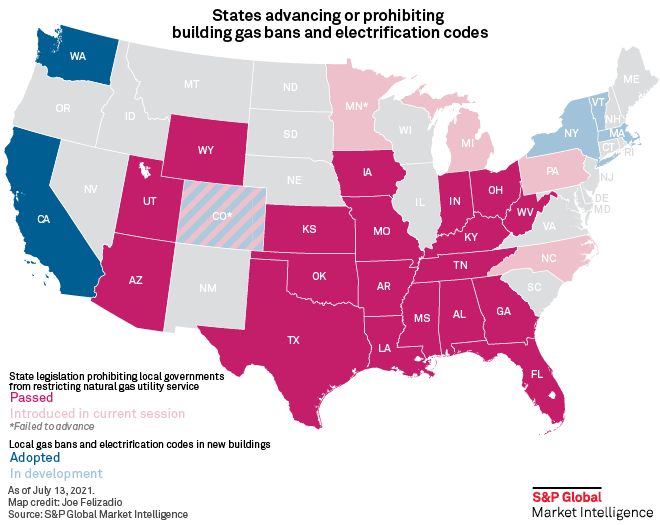S&P Global Offerings
Featured Topics
Featured Products
Events
S&P Global Offerings
Featured Topics
Featured Products
Events
S&P Global Offerings
Featured Topics
Featured Products
Events
Banking & Capital Markets
Economy & Finance
Energy Transition & Sustainability
Technology & Innovation
Podcasts & Newsletters
Banking & Capital Markets
Economy & Finance
Energy Transition & Sustainability
Technology & Innovation
Podcasts & Newsletters
S&P Global Offerings
Featured Topics
Featured Products
Events
10 Aug, 2021

|
The Senate approved a bipartisan infrastructure bill with fuel-neutral measures to decarbonize homes as Democrats sought to advance a budget reconciliation measure that would more explicitly support building electrification. |
A national debate over building electrification that kicked off in Berkeley, Calif., is bubbling up to Capitol Hill as Democrats seek to advance President Joe Biden's agenda to tackle climate change.
A new development came Aug. 9 when Senate Democrats released their framework for a $3.5 trillion budget reconciliation measure. The plan included instructions to fund building decarbonization programs proposed in Biden's Build Back Better plan.
The framework directs the Senate Committee on Energy and Natural Resources to develop a policy to offer consumers rebates to weatherize and electrify homes. It also instructs the Senate Committee on Homeland Security and Governmental Affairs to propose a plan for electrifying and rehabilitating federal buildings.
The instructions come after congressional Democrats on July 30 introduced legislation directing the U.S. Energy Department to establish a program to offer rebates for electric systems and appliances in single-family homes and multifamily buildings. The DOE has already embarked on a program that supports building electrification and electric heat pumps, an alternative to fossil fuel furnaces.
The outlook for those policies and others in the massive spending bill is uncertain. Biden and Democratic leaders must steer their agenda through the budget reconciliation process without any Republican backing, requiring the support of all 50 members of the Democratic caucus in the Senate. Meanwhile, the House of Representatives must still consider the Senate's $1 trillion bipartisan infrastructure bill that passed in the upper chamber Aug. 10.
The bipartisan Infrastructure Investment and Jobs Act includes funding for home energy audits, building upgrades and retrofits, and programs to help states implement new building energy codes. The bill did not include explicit support for building electrification, but it could help some local governments put in place codes that restrict gas use in new and existing buildings.
Senators addressed the movement to mandate building electrification on the chamber floor, offering insight into how U.S. lawmakers view an issue that has largely been debated at the state and local levels.

Sen. John Barrasso, R-Wyo., offered an amendment to the infrastructure bill that would prohibit state and local governments from using federal funding to implement codes that restrict or prohibit natural gas use in residential and commercial buildings. Barrasso's amendment failed on a party-line vote, with 46 Democrats and two independents opposed and 45 Republicans in support.
Barrasso, the ranking member on the Senate energy committee, noted that cities including San Francisco, Seattle, Denver and New York City have implemented or proposed building electrification mandates, prompting many states to ban the policy. He warned that building gas bans would drive up energy bills for Americans and construction costs for homebuilders in parts of the country.
"Consumers have to have a say in this. It shouldn't be government saying we know better than you do," Barrasso said, noting that Wyoming is a significant gas producer. "People want to use [natural gas]. They want to use it because they know the value to them and their families and their way of life."
Sen. Jeanne Shaheen, D-N.H., countered that nothing in the bill promoted prohibiting gas use. Shaheen noted that the American Gas Association and the National Association of Home Builders supported the code implementation program. Reading from a National Association of Home Builders letter that said the legislation preserved flexibility for state and local governments to deliver safe, energy efficient and affordable housing, Shaheen questioned why the federal government should interfere with state and local building code decisions.
The debate largely reflected arguments in state legislatures. Some lawmakers, chiefly Republicans, have sought to protect consumer access to natural gas utility service, while others, mostly Democrats, have argued that states should preserve local authority to set climate policy. In some cases, the state bills outlawing gas bans have drawn broad bipartisan support.
In addition to supporting funding for building code implementation in the infrastructure bill, the American Gas Association backed the bill's hydrogen research and development initiative and funding for energy audits and building upgrades.
"We appreciate the work your committee is doing to advance legislation that would put in place fuel-neutral approaches to addressing the country's energy infrastructure needs," the association said in a July 12 letter to the Senate energy committee.
